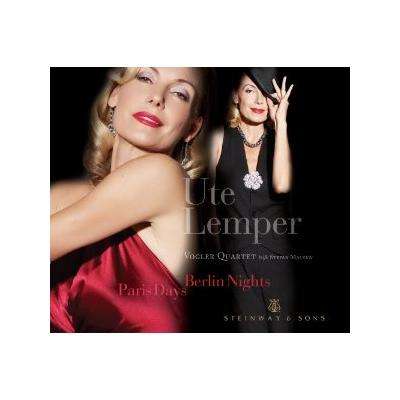|
Back
04/25/2012
“Paris Days – Berlin Nights”
Songs of Edith Piaf, Kurt Weill, Hanna Eisler, Astor Piazzolla, Chava Albertstein, and Jacques Brel: Elle fréquentait la rue Pigalle – L’Accordéoniste – Surabaya Johnny – Die Moritat von Mackie Messer – Der Graben – Uber den Selbstmord – Die Ballade vom Wasserrad – La última grela – Oblivion – Yo soy Maria – Temnaya Noch – Ikh shtey unter a Bokserboym – Stiller Abend – Ne me quitte pas
Ute Lemper (vocals), Stefan Malzew (piano, accordion, clarinet), Vogler Quartet: Tim Vogler (violin), Frank Reinecke (violin), Stefan Fehlandt (viola), Stephan Forck (cello)
Recorded at the Konzertkirche, Neubrandenburg – 60’14
ArkivMusic – 30009 Booklet in English, Lyrics in original language with English translations.

   
“Paris Days Berlin Nights”, the newly recorded recital by the distinguished chanteuse Ute Lemper and the Vogler Quartet, might be described as a songbook of the Weimar era. It is a veritable excursion in an ethnic time machine, via Europe and Argentina, through love, war, and despair into the decadent cabaret world of the Post WWII era.
There is no one who can evoke the spirit of this era better than Ute Lemper. She has been the reigning Queen of Cabaret for more than a quarter century now. Hearing her sing in this moving recording instantly conjures the specters of Edith Piaf, Marlene Dietrich, and Lotte Lenya. What is especially nice about her performance is that she does not try to reinvent these songs or interpret them with some modern light thrown on them. Ms. Lemper preserves the original style of this repertoire in an authentic presentation. If I may make the comparison, she approaches these songs in much the same way as Elizabeth Schwarzkopf might sing the songs of Franz Lehar or Robert Stolz. In other words she has respect for the music and the composer, and sings these songs as they were intended to be sung.
There is a sparkle of champagne and the lilt of a Parisian Waltz as she whirls through L’Accordéoniste. There is a soupçon of nostalgia infused into Elle fréquentait la rue Pigalle, both of these songs made famous by Edith Piaf. She rebukes the roguish sailor in Kurt Weill’s Surabaya Johnny from the musical HAPPY END with bitter remorse and irony, and a wonderful nastiness in her voice when she delivers the line “…and take that pipe out of your mouth…you dog!”
Ms. Lemper certainly knows her way around an Argentine tango. There is a great deal of Latin flavor in two songs by Astor Piazzolla. And in a third tango, Oblivion, Ms. Lemper has actually collaborated with Mr. Piazzolla by writing the lyrics herself.
The Jewish Kabarett songs are probably unfamiliar to most listeners. Temnaya Noch (In the Dark Night) by composer Nikita Bogolovsky, sung in Russian, is a war time lullaby, and Ikh shtey unter a Bokserboym (I Stand Beneath a Carob Tree), by the Polish born Israeli composer Chava Albertstein, is sung in the Yiddish dialect. These are marvelous songs, and they add a completely different layer of color and atmosphere to the collection.
Ute Lemper concludes the program with a very moving and romantic song by the late Belgian composer Jacques Brel, who will forever be remembered in the United States from the 1968 off-Broadway revue JACQUES BREL IS ALIVE AND WELL AND LIVING IN PARIS. I do not know this song nor do I remember it as being part of that revue. Ms. Lemper does her finest work in this piece. She gives a heart wrenching account of a distraught lover, who over and over again desperately implores him to Ne me quitte pas (Do not leave me). It sings of a forlorn and hopeless affair that the French seem to understand all too well.
The superb arrangements of all of the songs on this album were tastefully and stylishly done by Stefan Malzew. He employs a lot of instrumental color and musical tradition. He is obviously very sensitive to what Ute Lemper is searching for in this music. He adds contrast and counterpoint to the strings by playing the clarinet, piano, and accordion parts himself, and he plays these instruments very well indeed. The Vogler Quartet is also a happy choice to play the accompaniments. They are well in tune with the project, and provide that special sound which accurately evokes the required cabaret sonority. Speaking of herself and the members of the Vogler Quartet, Ms. Lemper says: “We are all the same generation of Germans. They are from the East and I am from the West, but still, I would definitely say we meet in the middle.” I can only concur with that assessment!
Micaele Sparacino
|